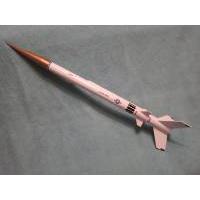Scratch Stiletto Original Design / Scratch Built
Scratch - Stiletto {Scratch}
Contributed by Jim Senecal
| Construction Rating: | starstarstarstarstar_border |
| Flight Rating: | starstarstarstarstar |
| Overall Rating: | starstarstarstarstar |
| Published: | 2012-05-22 |
| Manufacturer: | Scratch |
 Brief
Brief
This is an upscaled clone of the Estes Stiletto. This is one of my favorite rocket designs, it looks fast even standing still. This version uses BT-55 body tubes rather than the BT-50 of the original and is approximately 29" tall.
Components
The parts list for this rocket includes an 18" Estes BT-55 body tube, an additional 6" section of BT-55, and a tube coupler. The nose cone came from the Estes NC-55 nose cone set, and is the pointed straight cone. Also used was some 3/32" balsa stock for the fins, a small section of 1/8" balsa strip used to make the raceway and forward thrusters, an Estes 18mm engine mount, an Estes 18" parachute, 1/8" launch lug stock, and some 1/8" elastic fabric cord for the shock cord. Decals came from my stock of leftovers from other kits.
Construction
For intructions I downloaded the original Estes instructions from the JimZ website. I made fin patterns by upscaling the JimZ patterns. I then cut out the fins from the 3/32" balsa stock. I added a section to the root edge of the main fins as I intended to make through the wall fins. I rounded the fore and aft ends of the main fins as well as the small secondary fins. I built the engine mount in the standard fashion, and added centering rings cut from some cardboard stock. The two body tubes were glued together with the coupler. I inserted the engine mount into the body tube and allowed the glue to dry. Once the glue was dry I cut slits into the rear of the tube large enough for the main fin mounts. I glued the main fins on and allowed them to dry. I then lined up the seconday fins above the main fins and glued them on. Glue fillets were applied to all the fins. I then created the raceway out of the 1/8" balsa strip and glued it on, filleting it as well. The forward thrusters were also made from 1/8" stock, and glued on in line with the fins. I cut two launch lugs each about 3/4" long, and mounted them on some thin cardboard. The lugs were then glued to the side of the rocket as well, spaced along a side away from the raceway. The final bit of building on the body was to create the three raised bands around the body. One band goes directly to the rear of the small secondary fins, another directly to the rear of the foward thrusters, and the last just above the fore end of the raceway. I made the bands from the facecard frome an Estes rocket kit. The bands are about 1/4" wide and wrap around the circumference of the body tube. The wraps were glued on with white glue. Finally I added a shock cord using the standard tri-fold method, substituting fabric elastic for the typical rubber cord. For a rocket this size I have had good luck with this type of cord. Constuction went well, proceeding without any problems.
Finishing
I sealed all of the balsa with thinned Elmer's wood putty, then sanded this smooth. One thing I should have done was to fill and sand the fins prior to adding the body wraps. Sanding the aft end of the secondary fins and thrusters was complicated by the position of the wraps. Several coats of primer followed, sanding between coats. The final color was simple, I used Walmart gloss white on the entire body. The nose cone and the upper inch of the body tube were then sprayed with Walmart gold. Once all the paint was dry, I added the decals. I searched my stash of old decals and decal stripe stock to make the markings on the rocket. Luckily the markings are fairly simple so it was possible to do this. If you really want to go crazy you could buy decals from one of the aftermarket companies. I really had no issues overall with the painting or decaling.
Flight
This model has been flown twice using Estes B6-4 motors. The rocket performs very well on this motor, and would really go on a C6, but at my flying field it would probably be lost. On both flights, the rocket flew very straight.
Recovery
The rocket was equipped with a standard 18" Estes plastic parachute. On both flights the parachute ejected normally without issues and the rocket was recoverd with no damage.
Summary
Overall this is a great rocket design. It is only slightly more complicated than an ordinary 3FNC design, but really looks sophisticated. It also has the look of a real Air Force missle with the markings and the raceway. It also flies excellent.
Sponsored Ads
 |
 |












